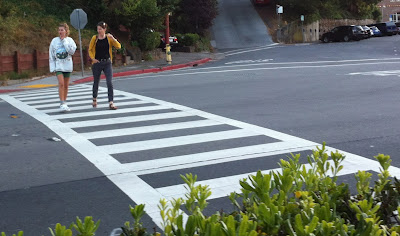It has taken me an entire MA with the OU, and now into the final stretch on a second MA, via 'Learning how to learn' courtesy of Coursera to realise how many steps it takes to reach 'essay perfection'.
It is like growing a seed, from compost, from food you have prepared weeks before: it all takes time to mature. Or rather, it requires time for your mind to make sense of a thing.
I am still uncomfortable with what I feel is wasted ink, digits or effort: I run a learning journal, I read, highlight and take notes. I may have an e-Book or a book in print. Either way I cover the thing in arrows and marks, then sift this through to a blog.
In time I decide I have to have a shot at answering the question.
This invariably goes horribly wrong. I realise I am way off the mark, and that I am leaning on old ideas as props that might through light on the subject, but don't fit.
I keep reading. I keep drilling on through references. I keep making lists. I prioritise. I focus. And then an essay or two, an article or book out of the blue pull it all together and the tangled mess falls away to reveal greater clarity.
I have gone from the man with the drone and a microscope looking at a forest, to a forester. I am on the ground with my fingers and eyes. It is starting to make sense.
Time. Sleeping on it. Getting it wrong. Talking it through. Having a go. Fixing mistakes.
Key for me is 'Talking it through'. I wished it, reluctantly upon my wife for 15 minutes and she, the daughter of an Oxford Don obliged.
What I need right now is a 'tutorial': an expert, and three idiots struggling with the topic. An hour of talking it through and you come away with a set of facts prioritised and a 'narrative' for the argument.
Never leave it to the day before. I am 8 days out from submitting this essay. I am reading for another go at writing it.
I don't care, for now, about the 4,000 word limit. I want to answer the question fully and succinctly, with evidence. I will trim later, or add a growing agent to the roots if it is falling short.
Writing is the last thing I should do. I wish it were an exam. I wish I had to pull in all the facts then turn up for a 3 hour exam. Today I will simply vomit words onto sheets of paper. Prepared for an exam I will have, in my mind, a set of some 32 cards, each with a note or fact or idea on them. I will then sit down, look at the time I have, make a quick plan for my response, then mentally set the 20 or so cards I need into the mix. Then I write. Then I fix. Then the bell goes and I am done.
Maybe I should do it this way? This Wednesday evening I will see what I can write, long hand, in an hour. (A fraction of how much I could type). Sometimes the pen is best - it slows you down.




